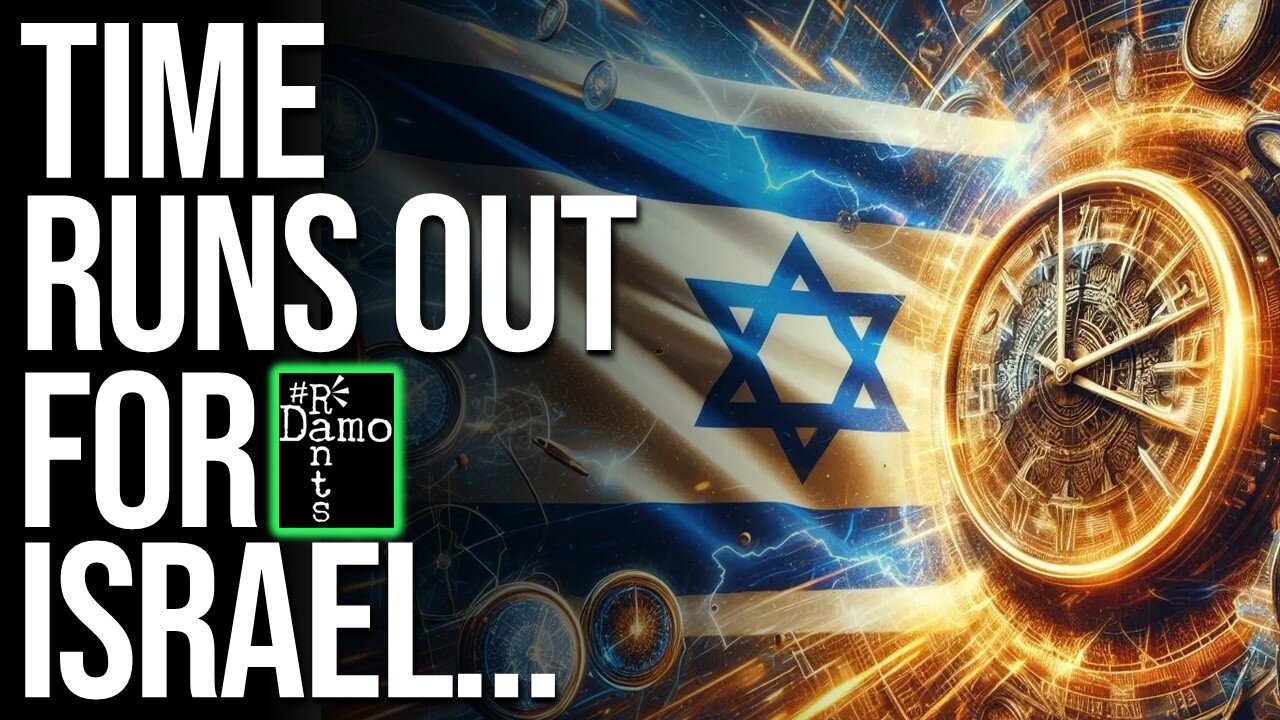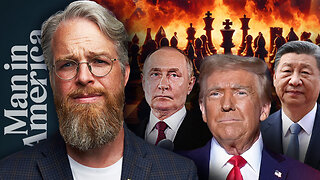Premium Only Content

Israel's Impunity Is On Life Support - And It's Getting Switched Off
Right, so it turns out you don’t need tanks, aircraft carriers, or billion-dollar trade agreements to stand up to genocide—you just need a spine. In Bogotá, nations with a fraction of Europe’s wealth have shown more moral courage in two days than the entire EU has managed in nearly a year of Israeli bombs falling on Gaza. While Colombian President Gustavo Petro and UN Special Rapporteur Francesca Albanese talked about legal obligations, Brussels talked about ‘political sensitivities.’ While South Africa and Malaysia pledged embargoes, Ursula von der Leyen pledged more empty words. The Global South is acting like the Europe of Nuremberg; Europe, meanwhile, is acting like the Europe of Vichy—shrugging as crimes continue to unfold in real time.
Right, so over the last couple of days, two very different worlds have confronted the question of justice for Gaza. In Bogotá, a coalition of over thirty nations from the Global South and others convened in an atmosphere of urgency and determination. The goal was not to debate or issue symbolic statements but to take concrete action against Israel’s war on Gaza, which the International Court of Justice (ICJ) has already deemed plausibly a genocide. These countries—many of them smaller economies with limited military or economic power themselves—pledged real, enforceable measures regardless: arms embargoes, maritime restrictions, public contract reviews, and the use of universal jurisdiction to prosecute those responsible for atrocities. This was international law as it was intended to function—applied without fear or favour, and based on legal obligations rather than political expediency.
In Brussels, by contrast, Europe, with all its wealth, institutions, and self-proclaimed moral leadership, dithered. The European Union, which never misses an opportunity to lecture the Global South on human rights, continues to shield Israel from meaningful accountability. Despite ICJ provisional measures, International Criminal Court (ICC) arrest warrants for Benjamin Netanyahu and Yoav Gallant, and growing public outrage, the EU has refused to suspend its trade and association agreements with Israel or to restrict dual-use technology and military exports. It issues platitudes of “concern” while continuing business as usual with a state accused of genocide.
The gap between these two worlds has now been laid bare not only morally but legally. French and Belgian jurists have filed an unprecedented case at the Court of Justice of the European Union (CJEU), accusing the European Commission and Council of “serious and prolonged inaction” in failing to prevent genocide in Gaza. If successful, Brussels could be legally compelled to adopt measures similar to those announced in Bogotá. The damage to Europe’s credibility, will be deserved.
Francesca Albanese, the UN Special Rapporteur on the situation of human rights in the occupied Palestinian territories, captured the moment perfectly when she asked delegates in Bogotá:
‘I ask you to consider this moment as if we were sitting here in the 1990s, discussing the case of apartheid South Africa. Would you have proposed selective sanctions on South Africa for its conduct in individual Bantustans? Or would you have recognized the state’s criminal system as a whole?’
Would you have proposed selective sanctions on South Africa when it was committing apartheid? Or would you have recognized the system as criminal in its entirety? Well we know what history did don’t we so why is Israel any different?
The Bogotá summit, held over the last couple of days, was more than just another international meeting. It was a statement of intent: the Global South will no longer wait for Western powers to act when international law is being trampled, too many of them excusing Israel all the way. The newly-formed Hague Group, comprising of twelve lead nations rising to thirty to greater or lesser extent, presented itself as a coalition willing to enforce international law where the traditional arbiters, such as the US, EU, and their allies—have failed.
Gustavo Petro, Colombia’s progressive president and host of the summit, set the tone with uncompromising language when he stated that will not be complicit in a genocide while claiming to be democratic. His words, reported widely by Press TV and Al Jazeera, resonated precisely because they came from a leader who has long criticised US and European double standards. South Africa brought its unique moral authority to the table, having already filed the genocide case against Israel at the ICJ, it’s history of apartheid and defeating it well documented and which fundamentally changed the legal discourse around Gaza. Malaysia emphasised its commitment to defending Palestinian rights, while Bolivia and Namibia explicitly linked their participation to a broader anti-colonial and anti-apartheid struggle.
The Hague Group’s six-point action plan, though summarised in headlines, is worth unpacking in detail for its legal and strategic implications. The commitment to halt all transfers of arms, ammunition, military fuel, and dual-use technologies to Israel is significant even if some signatories are not major arms suppliers. It operationalises obligations under Article I of the Genocide Convention, which requires states to prevent genocide wherever possible. As an article written by Albanese herself in The Nation put it, this was international law moving from words to action.
Maritime and port restrictions may prove even more consequential. By denying refuelling, docking, and servicing to vessels carrying military cargo to Israel, Bogotá’s signatories are creating immediate logistical challenges. Shipping companies, already wary of reputational damage, will have to now avoid the likes od South African and Colombian ports. These disruptions, while not crippling by themselves, are strategically important: they normalise the idea of economic pressure on Israel as a legitimate response to genocide.
The commitment to exercise flag-state authority—refusing to allow ships registered under participating countries to carry Israeli-bound military cargo—is similarly symbolic but still significant. Flag-state enforcement has been used effectively in other sanctions regimes, and its adoption here sets a precedent that could be expanded if larger economies join the Hague Group by the target date of 20 September.
The most significant measures are the legal ones though. Public contract reviews will directly hit Israeli-linked arms and tech companies. Malaysia has already begun reviewing procurement contracts with surveillance tech suppliers implicated in the occupation, and South Africa is expected to cancel several agreements with firms supplying crowd-control and cyber-surveillance systems to Israeli security forces. These steps mark a major escalation of what was previously a civil-society-driven boycott movement. When governments begin formally divesting, it signals to investors that Israel is becoming a long-term financial and reputational risk.
Finally, the Bogotá Declaration’s commitment to universal jurisdiction prosecutions is a big legal shift. Universal jurisdiction allows states to prosecute serious international crimes—such as genocide or crimes against humanity—regardless of where they occurred or the nationality of the accused. South Africa has already moved in this direction; Colombia’s attorney general announced that preliminary inquiries into war crimes in Gaza would begin immediately. Bolivia has signalled similar intentions.
For Netanyahu, these measures represent more than symbolic condemnation; they are a strategic crisis unfolding on multiple fronts.
Diplomatically, Bogotá isolates Israel in regions where it has spent years cultivating influence. Over the past decade, Israel has invested heavily in military and agricultural partnerships in Africa and Latin America, hoping to counteract its growing isolation in Europe and the Arab world. Now, those efforts are being undone. The Hague Group’s explicit framing of Israel’s actions as genocide—and the operationalisation of that framing through enforceable measures—undermines Israel’s narrative of legitimacy. A new moral consensus is emerging, defined not in Washington or Brussels but in Bogotá, Pretoria, and Kuala Lumpur.
Economically, the public contract reviews threaten sectors central to Israel’s economic strategy. Israeli cybersecurity and surveillance technology exports, which account for billions annually, rely on government contracts in Global South markets. Malaysia’s contract reviews alone could disrupt major deals, and if South Africa follows, Israeli tech firms may see cascading cancellations across Africa. These moves align with the growing BDS movement of course and amplify its reach by adding state-backed enforcement.
Militarily, while the Hague Group countries are not major arms suppliers to Israel, the maritime restrictions and port bans create logistical and cost pressures. More importantly, they set a precedent that may influence larger economies. If Bogotá’s measures expand to include countries like Brazil or Indonesia, Israel’s military supply chains could face serious disruption.
Legally, the universal jurisdiction commitments are the most dangerous for Netanyahu personally. Already facing ICC arrest warrants, he and other Israeli officials may soon face arrest risks in an expanding number of jurisdictions around the world. Travel to Latin America or Africa, which might have once been routine for Israeli leaders, instead may become diplomatically and legally hazardous now. Netanyahu thrives on projecting strength; being seen as a wanted man unable to travel freely damages his domestic political standing.
Symbolically, the Bogotá summit destroys Israel’s narrative of impunity. Netanyahu has long relied on the argument that outrage against Israel is rhetorical and antisemitic even, that no state will take real risks to oppose that and those accusations. The Hague Group proves otherwise.
In this context, Europe’s failure to act is even more damning therefore. The EU, which claims to champion human rights, has done nothing comparable, in fact its just announced it isn’t going to either. It continues to trade weapons components and dual-use technology with Israel, despite ICJ provisional measures and ICC arrest warrants. Its refusal to suspend the EU–Israel Association Agreement—despite clear violations of its human rights clause—exposes its “values-based foreign policy” as a hollow slogan.
The legal case against Europe is strong. Under the Genocide Convention, the EU has a duty to prevent genocide, especially given its economic influence over Israel. The ICJ’s 2007 Bosnia v. Serbia ruling confirmed that states with the capacity to influence perpetrators must act. The EU’s inaction thus risks not only political condemnation but legal liability.
Domestically, the EU’s paralysis is fuelling political backlash as well. Millions have protested across European capitals, and polling shows majority support for arms embargoes. Progressive parties are seizing on Gaza as a defining moral issue. Spain, Ireland, and Belgium have pushed for stronger action but have been blocked by the likes of Germany and Hungary. The structural flaws of the EU’s consensus-based foreign policy are now on full display: moral urgency is consistently overruled by economic interests and political caution.
The hypocrisy is glaringly obvious too. The EU imposed sweeping sanctions on Russia within weeks of its invasion of Ukraine, citing the need to defend international law. Yet when faced with a genocide in Gaza, its response has been limited to concern. For the Global South, this confirms long-standing suspicions that European human rights rhetoric is selectively applied.
Strategically, this hypocrisy undermines Europe’s credibility too. As The Cradle observed, the Hague Group’s actions have shifted the moral narrative. Europe no longer looks like a defender of international law; it looks like a bystander—and worse, a complicit one.
The CJEU case filed by French and Belgian jurists is a direct challenge to this hypocrisy. Filed under Article 265 of the Treaty on the Functioning of the European Union, it accuses the Commission and Council of “serious and prolonged inaction” in failing to prevent genocide. The case argues that the EU has violated its obligations under both EU law and the Genocide Convention by refusing to suspend its association agreement with Israel or restrict military exports.
This case could have profound consequences. If the court rules in favour of the petitioners, Brussels could be legally compelled to impose sanctions or suspend trade agreements. It would also embolden domestic courts across Europe to pursue universal jurisdiction cases, not only against Israeli officials but against European companies supplying arms or surveillance technology to Israel.
As L’Orient Today noted, this is not just about Gaza; it is about whether Europe’s legal order can survive the accusation that it stood by in the face of genocide. The Bogotá summit makes the EU’s position even harder to defend: if smaller economies can act on their legal obligations, why can’t Europe?
One of the most underexplored aspects of Europe’s inaction is corporate complicity. Major European arms manufacturers, including Germany’s Rheinmetall and Italy’s Leonardo, continue to supply components used by the Israeli military. Dual-use technologies from European tech firms have been linked to surveillance systems used in the occupation of Gaza. These companies are now legal targets. The Hague Group’s universal jurisdiction commitments create a legal pathway for prosecuting corporate executives for aiding and abetting war crimes. If the CJEU forces EU institutions to act, these companies may face contract cancellations and reputational damage.
Europe’s governments may not act voluntarily, but they face growing electoral risks. In Spain, Ireland, and Belgium, progressive parties are already framing Gaza as a test of moral leadership. In Germany, the Greens are under pressure from their base to demand arms embargoes. As protests grow, politicians who continue to shield Israel risk alienating voters, particularly younger generations.
The Bogotá summit is also significant for what it signals about the future of global governance. For decades, enforcement of international law was dominated by Western powers. Now, the Global South is stepping into that role. The Hague Group’s decisions demonstrate that smaller states can enforce legal obligations independently of US or EU approval.
The Bogotá summit therefore was not just a diplomatic gathering; it was a historic turning point. By taking concrete action where the West has failed, the Hague Group has claimed the moral leadership once associated with post-war Europe. For Netanyahu, Bogotá is a strategic disaster; for the EU, it is a test of its very identity.
This is, as Francesca Albanese said, Europe’s South Africa moment. If it continues to dither, history will not record it as a defender of human rights but as a cowardly bystander that hid behind legal technicalities while Gaza burned. And this time, the Global South will not wait for Europe to catch up—it will enforce the law itself.
For more on why Israel could be heading towards its Nuremberg moment in relation to this meeting, do check out this video recommendation out here as your suggested next watch.
Please do also hit like, share and subscribe if you haven’t done so already so as to ensure you don’t miss out on all new daily content as well as spreading the word and helping to support the channel at the same time which is very much appreciated, holding power to account for ordinary working class people and I will hopefully catch you on the next vid. Cheers folks.
-
 10:47
10:47
Nikko Ortiz
1 day agoThese Tik Tok Clips Are Extremely Painful...
37.7K4 -
 13:43
13:43
GritsGG
12 hours agoI Made a Brand New Warzone Account! Will I Get Bot Lobbies?
1.69K -
 1:09:23
1:09:23
The HotSeat
12 hours agoTrump’s Parade = Mocked, China’s Parade = Praised: Leftist Hypocrisy EXPOSED
26.1K33 -
 LIVE
LIVE
Lofi Girl
2 years agoSynthwave Radio 🌌 - beats to chill/game to
220 watching -
 4:34:26
4:34:26
Akademiks
6 hours agoICEMAN EPISODE 3
148K -
 2:04:10
2:04:10
Inverted World Live
8 hours agoThe Robots Are Here | Ep. 103
61.6K14 -
 1:21:53
1:21:53
Man in America
16 hours agoInflation, Debt & War: The 2032 Crash Cycle Is Here—Nations Will FALL w/ Martin Armstrong
58.1K20 -
 1:53:48
1:53:48
Adam Does Movies
15 hours ago $3.13 earnedTalking Movies + Ask Me Anything - LIVE
24.1K2 -
 2:55:43
2:55:43
TimcastIRL
7 hours agoTrump DOJ To Ban Trans People From Owning Guns After Catholic School Shooting | Timcast IRL
187K112 -
 3:21:36
3:21:36
The Quartering
7 hours agoBaldur's Gate 3 First Playthrough!
50K8